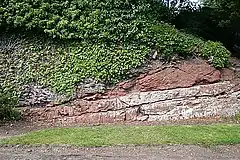Locharbriggs Sandstone Formation
The Locharbriggs Sandstone Formation is a formation of Cisuralian age (Early Permian). It consists of a 1000 m thick sequence of very well-sorted aeolian sandstones, with well developed dune cross-bedding.[1] The sandstone was used as a building stone in Dumfries, Edinburgh, Glasgow and New York (including the steps of the Statue of Liberty).[2]
| Locharbriggs Sandstone Formation | |
|---|---|
| Stratigraphic range: Cisuralian | |
 Locharbriggs Sandstone Formation | |
| Type | Geological formation |
| Unit of | Stewartry Group |
| Underlies | Doweel Breccia Formation |
| Overlies | unconformity on Lower Paleozoic |
| Area | Dumfries Basin, North Solway Basin |
| Thickness | 1000 m |
| Lithology | |
| Primary | Sandstone |
| Location | |
| Country | |
| Type section | |
| Named for | Locharbriggs |
References
- British Geological Survey. "Locharbriggs Sandstone Formation". BGS Lexicon of Named Rock Units. Retrieved 1 June 2019.
- Gazetteer for Scotland. "Locharbriggs, Dumfries and Galloway". Retrieved 1 June 2019.
This article is issued from Wikipedia. The text is licensed under Creative Commons - Attribution - Sharealike. Additional terms may apply for the media files.